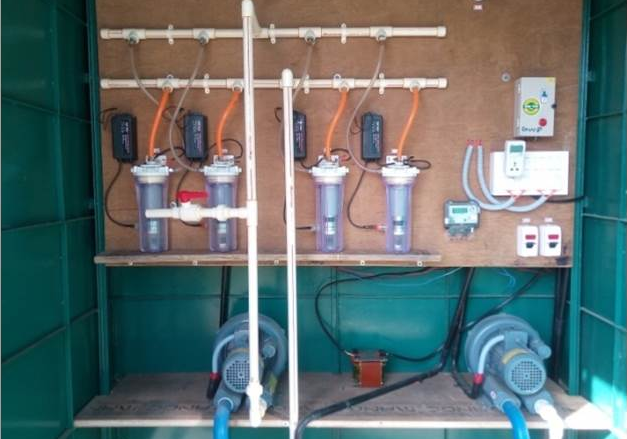N.B. Nair
Bengaluru (ISJ): Scientists at the Bengaluru-based Indian Institute of Science (IISc) developed a unique wastewater recycling technology that is local by every sense of the word, and runs on solar energy.
The technology provides a robust wastewater management system that can be replicated in both rural and urban settings, taking various factors like space, power consumption and maintenance.
“The idea was to show that it can be installed in a rural setting. You design in such a way that there is no breakdown, no difficulty in getting spares. Secondly, it can be operated by even a non-technical person with very little knowledge about any technology – very simple, gravity-based system and it is grid-independent,” Professor Lakshminarayana Rao, Assistant Professor at the Centre for Sustainable Technologies at IISc and lead innovator told Indian Science Journal.
The first demonstration plant was set up at a school in Berambadi village in Chamarajanagar district of Karnataka. The school used to consume 4,500 litres of water a day and the objective was to bring down the footprint by half, using a combination of technologies, said professor Rao. The system also treats black water before discharging it out.
“We separated grey water and black water – grey water is the wastewater from kitchen, wash basins etc, while the black water is the wastewater from toilets. So we decided to treat grey water for non-potable applications, since there is a stigma attached to using treated black water,” Professor Rao explained the objective of setting up the first plant in a school in the rural, water-deficient area, where uninterrupted power supply could not be ensured.
The demonstration project used handwash and kitchen wash wastewater streams and treated it separately due to differences in the initial grey water characteristics.
The treatment stages included pre-treatment using screens and grease traps, slow sand bio-filtration combined with anaerobic sludge bioreactor, and aeration before the final ozone-based disinfection stage. The treated water at the end of all these stages was used for toilet-flushing in the school.
During the operation system for one year and sampling performed to investigate its performance, it showed removal efficiencies for turbidity (99 percent), total suspended solids (98 percent), nitrate (66 percent), total phosphorus (73 percent), biological oxygen demand (98 percent), chemical oxygen demand (96 percent and fecal coliform (99.99 percent).
The scientists associated with the development of the technology said, though it was possible to recycle potable water from wastewater, primarily the objective of the first plant was not generating potable water, and secondly there would have been hesitation to use recycled water for consumption, though it was being done in countries like Singapore.
Professor Rao pointed out that the current technology could be upscaled to recycle sewage generated in houses and communities. He said, a real estate developer in Bengaluru have adopted the technology for its upcoming eco-friendly housing project of about 200 houses with an installed capacity of 110 kilolitres per day (KLD). The recycling capacity could be scaled up to treat a few million liters of water per day (MLD), he added.
The overall cost of the project is also estimated to be half or less compared to existing facilities in cities. For example, the cost of a Decentralised Wastewater System with an installed capacity of one kilolitre is about INR 60-80,000, whereas the one developed by the IISc scientists would be 40 to 50 percent cheaper.
In terms of operating cost, the Bengaluru Water Supply and Sewerage Board (BWSSB), which runs huge plants, the cost per kilolitre is about INR 20-27. On the contrary, the estimated cost of treatment of water using the new technology would work out to INR 10-14 only.
Though technologies are available for wastewater treatment, it was for the first time, the scientists at IISc have put together a few technologies together in a local setting.
“The technologies available are in bits and pieces. We have assimilated multiple technologies. It is a grid-independent, stand alone system, operated on solar power, which combines certain technologies and certain innovations to it as well. The innovation is how you design each of these components to treat the local needs and other constraints,” pointed out Professor Rao.
According to a study by the government think-tank Niti Ayog, the per capita availability of water in India is set to decline to 1,465 cubic metres by 2025 from 1,544 cubic metres in 2011.
Several cities in the country, like Chennai and Shimla already face acute shortage of water due to urbanisation, climate change and lack of appropriate infrastructure, which continues to put stress on existing infrastructure. Recycling and reuse of treated wastewater could be one of the measures to reduce the pressure on water resources.
The new study carried out in collaboration with researchers in the UK was published in the Journal of Water Process Engineering.
Image credit: IISc, Bengaluru


